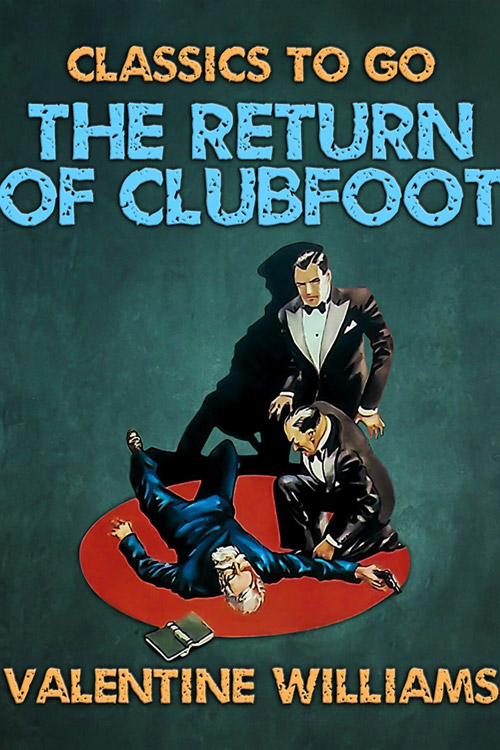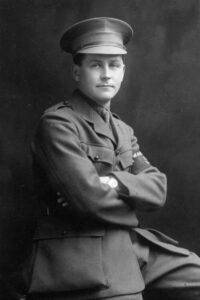
The Return of Clubfoot
As I sat on the verandah of John Bard’s bungalow, glancing through a two-month-old copy of The Sketch, I heard the clang of the iron gate below. I raised my eyes from the paper and looked down the gardens. At my feet was stretched a dark tangle of palms and luxuriant tropical verdure. Beyond them in the distance was the glass-like surface of the sea, on which a great lucent moon threw a gleaming path of light.
The night was very tranquil. From the port at the foot of the hill, on which my old friend, John Bard, had built his bungalow in this earthly paradise, the occasional screech of a winch wafted with astonishing clearness over the warm air. Somewhere in the distance, there was the faint monotonous thrumming of guitars. To these night noises of the little Central American port, the sea murmured faintly a ceaseless accompaniment.
I heard voices in the garden. Within the house a door swung with a thud; there was the patter of slippered feet over the matting in the living room and Akawa, Bard’s Japanese servant, was at my elbow. His snow-white drill stood out against the black shadows that the moon cast at the back of the verandah. He did not speak, but his mask-like face waited for me to notice him.
“Well, Akawa?” said I; “what is it?”
“Doña Luisa ask for the Señor Commandante, excuse me!” announced the Jap stolidly.
Comfortably stretched out in a cane chair, a cold drink frosting its long glass in the trough at my side, I turned and stared at the butler. I was undoubtedly the Señor Commandant, for thus, in the course of a lazy, aimless sort of holiday on the shores of the Pacific, had my rank of Major been hispaniolised.
But what lady wanted me? Who could know me here, seeing that only the day before one of John Bard’s fruit ships had landed me from San Salvador?
Doña Luisa! The name had an alluring, romantic ring, especially on this gorgeous night, the velvety sky powdered with glittering stars, the air heavy with perfumes exhaled from the scented gardens. That broad strain of romance in me (which makes so much trouble for us Celts) responded strongly to the appeal of my environment. Doña Luisa! The distant strains of music seemed to thrum that soft name into my brain.
I swung my feet to the ground, stood up, and stretched myself.
“Where is the lady?” I demanded. “In the sitting room?”
“No, sir,” replied the Japanese. “In the garden!”
More and more romantic! Had some lovely señorita, in high comb and mantilla, been inflamed by a chance sight of the Inglez as I had walked through the grass-grown streets of the city with John Bard that morning, and pursued me to my host’s gardens to declare her love? The thought amused me and I smiled. Yet I don’t mind admitting that, on my way through the sitting room in Akawa’s wake, I glanced at a mirror and noted with satisfaction that my white drill was spotless, and my hair smooth. I adjusted my tie and with that little touch of swagger which the prospect of a romantic rendezvous imparts to the gait of the most modest of us men, I passed out of the room to the corridor which led to the door into the gardens.
The passage was brightly lit so that, on emerging into the darkness again, my eyes were dazzled. At first, I could only discern a vast black shape. But presently I made out the generous proportions of an enormously stout, coal-black negress.
Read or download Book
Valentine Williams
George Valentine Williams, (1883–1946) was a journalist and writer of popular fiction.
Biography.
Williams was born in 1883. He was the eldest son of the chief editor at Reuters; both his brother and an uncle were also journalists. He replaced Austin Harrison as the Reuters correspondent in Berlin in 1905, aged 21. In 1908, he left Reuters to join the Daily Mail, filing stories from Paris and covering the Portuguese Revolution of 1910. He was in the Balkans at the outbreak of World War I and became one of the first accredited war correspondents in March 1915. William Beach Thomas had been reporting the war for the Daily Mail in the period before official accreditations were granted. When the British government relented its opposition to the presence of journalists in 1915, having been warned by Theodore Roosevelt that reporting limitations were affecting public opinion in the United States, Williams stepped into the role.
In December 1915, Williams enlisted for service in the Irish Guards and Beach Thomas took his place as an accredited reporter in France. Williams was awarded the Military Cross as a soldier and wrote two autobiographical books about his wartime experiences. In the aftermath of the war, he traveled widely as a reporter, covering events such as the Versailles Peace Conference and the discovery of the tomb of Tutankhamun, as well as events in America. Harold Nicolson met him in connection with events at Versailles and described in a diary entry that “He is far too intelligent to be employed by such a paper” (the Daily Mail). It was during this period that he began writing thrillers and around 1926 he gave up his post as Foreign Editor of the Daily Mail to pursue a full-time career as an author.
Williams was too old for active service at the outbreak of World War II. He joined the Secret Intelligence Service, vetting potential recruits such as Malcolm Muggeridge and Kim Philby. He was transferred to the British Embassy in Washington in 1941 but soon after left for Hollywood, where he worked as a scriptwriter for Twentieth-Century Fox and Metro-Goldwyn Mayer.
Williams was married to Alice Crawford. He died in 1946.






